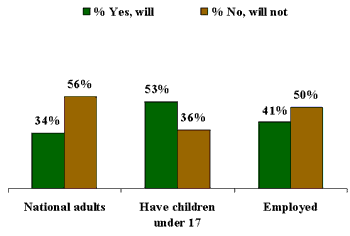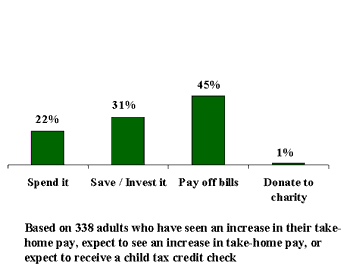GALLUP NEWS SERVICE
PRINCETON, NJ – Last week's report that the U.S. unemployment rate reached a nine-year high in June has financial analysts pinning much hope on the economic impact of new federal tax cuts scheduled to go into effect this month. Undermining that hope, a recent CNN/USA Today/Gallup poll finds that most Americans have limited expectations about whether the new changes will boost their own finances.
Only one-third of U.S. adults (34%) say that the new federal tax cut law enacted in May will be beneficial to their family's financial situation. A majority (56%) says it will not. In line with the particulars of the tax cut, working Americans and those with children under 17 are somewhat more likely to believe the tax cut will help them than are other Americans.
| Do you think the new tax cut law will – or will not – help your family's financial situation? |
 |
| June 27-29, 2003 |
The $350 billion tax cut package signed into law by President Bush on May 28 accelerates the phase-in of a previously enacted tax cut on wages. It also lowers the tax rate on capital gains and dividends, and increases the maximum child tax credit by $400 (from $600 to $1,000). While only half the size of the original tax cut Bush proposed earlier this year, the administration now touts the positive impact the enacted cuts will have -- estimating that 91 million taxpayers will receive, on average, a tax cut of $1,126 under the new law. Critics, on the other hand, claim that this figure is skewed by the large reduction expected in taxes on dividends and capital gains, which will mostly benefit upper-income Americans. Citizens for Tax Justice reports that the median tax reduction over the next two years will be just $120 -- with half of Americans receiving less than that amount and half receiving more.
Upper-Income Americans Most Optimistic About Tax Benefit
Roughly 60% of Americans are currently employed, and about a third have a child under the age of 17. When Gallup asked these groups about their likelihood of seeing increases in take-home pay or the child tax credit, respectively, only about half of each group thought they would. These figures translate into 26% of all Americans expecting to receive an increase in their take-home pay as a result of the new tax rates, and 19% of Americans expecting to receive a child tax credit rebate check this summer.
As the chart below details, Americans in the highest income bracket, those earning $75,000 or more per year, are the most optimistic about receiving financial relief. Responses are also quite partisan: Republicans are much more positive than Democrats about their chances of benefiting from the changes.
|
Summary of Public Reaction to 2003 Tax Cut Package
|
|||
|
Will help family finances |
Expect higher take-home pay |
Expect child tax credit rebate |
|
|
% |
% |
% |
|
|
National adults |
32 |
26 |
19 |
|
$75,000 or more |
44 |
37 |
26 |
|
$50,000-74,999 |
37 |
29 |
24 |
|
$20,000-49,999 |
32 |
25 |
20 |
|
Less than $20,000 |
22 |
17 |
7 |
|
Republicans |
51 |
31 |
23 |
|
Independents |
27 |
29 |
18 |
|
Democrats |
21 |
18 |
16 |
It is not clear how realistic these differences in expectations by income and party ID are. For instance, the child tax credit rebate is phased out at higher income levels, starting at $75,000 of annual income for single filers and $110,000 for married couples filing jointly. Thus the higher expectation among upper-income respondents for receiving the rebate may be overly optimistic on their part. Also, while the different average income levels of Republicans and Democrats may account for a real gap in the benefits each partisan group might expect from the tax changes, those income differences probably don't account for the very large gap observed in their expectations.
Good Intentions for Use of Tax Windfall
A key question for economists is whether Americans will save or spend the extra money they pocket from the new tax law. True to form, Americans are highly responsible in their answer to this question. Three-quarters of those who expect to receive an increase in take-home pay as a result of reduced federal tax withholding and/or who expect to receive a rebate check on the child tax credit say they will either save this money (31%) or use it to pay off bills (45%). Only 22% admit they will do what George W. Bush and many economists are hoping -- spend it. (It should be noted, however, that using the money to pay down bills might indirectly boost spending by freeing people up to spend or charge more.)
| What will you do with the additional money you will be receiving from the new tax cut legislation? Spend it, save or invest it, pay off bills, or donate it to charity? |
 |
| June 27-29, 2003 |
Survey Methods
These results are based on telephone interviews with a randomly selected national sample of 1,003 adults, 18 years and older, conducted Jun. 27-29, 2003. For results based on this sample, one can say with 95 percent confidence that the maximum error attributable to sampling and other random effects is plus or minus 3 percentage points. In addition to sampling error, question wording and practical difficulties in conducting surveys can introduce error or bias into the findings of public opinion polls.
22. Do you personally have any children under age 17 living in your home?
|
Yes |
No |
No opinion |
|
|
2003 Jun 27-29 |
35% |
65 |
-- |
D15. Which of the following best describes your current situation -- employed full-time, employed part-time, retired, a homemaker, a student, unemployed but looking for work, or unemployed and not looking for work?
|
2003 Jun 27-29 |
|
|
% |
|
|
Employed full-time |
54 |
|
Employed part-time |
5 |
|
Retired |
20 |
|
Homemaker |
8 |
|
Student |
5 |
|
Unemployed but looking for work |
5 |
|
Unemployed and not looking for work |
* |
|
DISABLED (vol.) |
3 |
|
No opinion |
* |
23. Now, turning to the tax law passed a few weeks ago, do you think the new tax cut law will – or will not – help your family's financial situation?
|
Yes, will |
No, will not |
No opinion |
|
|
2003 Jun 27-29 |
34% |
56 |
10 |
|
2003 May 30-Jun 1 |
35% |
56 |
9 |
24. Which of the following best describes your situation – you have noticed an increase in your take-home pay in recent weeks because of the new tax cut, you expect to see an increase in your take-home pay, but you have not seen it yet, or you do not expect to see an increase in your take-home pay because of the new tax cut?
BASED ON 583 ADULTS EMPLOYED FULL OR PART-TIME
|
Noticed an increase in |
Expect to see increase in |
Do not expect increase in |
|
|
|
2003 Jun 27-29 |
15% |
30 |
50 |
5 |
25. Do you expect to receive a check from the government this summer as a result of the provision in the new tax law increasing the tax credit for children under age 17, or not?
BASED ON 314 ADULTS WHO HAVE CHILDREN UNDER AGE 17 LIVING AT HOME
|
Yes, expect check |
No, do not |
No opinion |
|
|
2003 Jun 27-29 |
53% |
37 |
10 |
26. What will you do with the additional money you will be receiving from the new tax cut legislation? [ROTATED: spend it, save or invest it, pay off bills, (or) donate it to charity]?
BASED ON 338 ADULTS who have seen an increase in their take-home pay, expect to see an increase in take-home pay, or expect to receive a CHILD TAX CREDIT check
|
Spend |
Save/invest it |
Pay off |
Donate to charity |
No |
|
|
2003 Jun 27-29 |
22% |
31 |
45 |
1 |
1 |
* -- less than 0.5%

